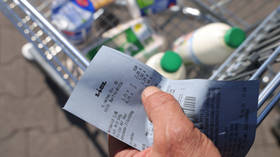Germany counts cost of Russian gas cut-off

German inflation may well exceed 10% by the end of the year if gas supplies from Russia are cut off, Deutsche Bank head Christian Sewing said in an interview with the Frankfurter Allgemeine Sonntagszeitung, published on Saturday.
“If Russian gas continues to flow [into Germany], we should reach an inflation rate of around 8% by the end of this year. But inflation would be higher if the gas stopped flowing. Then 10% or more is possible,” Sewing said.
The CEO pointed out that losing gas supplies from Russia “would have a significant impact on economic growth in Germany” and the country “will definitely slip into recession.”
He noted that “with the right interest rate hikes and the right policies, there is still a chance to bring [inflation] down to 5-6% next year, and then get close to the actual target of 2% again in 2024.” However, such measures “will take time, so we should not give people false impressions,” he added.
Commenting on the recent move by the European Central Bank (ECB) to hike interest rates, he said the ECB “is moving in the right direction.”
“Currency devaluation is poison for people. I am grateful that the ECB is well aware of the problem and has now given a clear signal to raise the rate by 0.5 percentage points. We have been saying for a long time: higher inflation is not a temporary phenomenon, and it needs to be dealt with seriously,” Sewing stressed.
He warned, however, that the worst may still be ahead for the German economy.
“The biggest burden for many people is yet to come. If monthly expenses exceed income, people will consume less and the mood of the country will deteriorate as well. It’s all the more important that the right steps are taken early on,” the banker stated.
Inflation in Germany soared this month, jumping to 8.5% year-on-year in July after dropping to 8.2% in June as a result of government relief measures. This comes as elevated food prices and surging energy costs continued to plague the country. In a poll published by the newspaper Bild earlier this month, half of respondents said they feel their economic conditions are deteriorating, seeing rising prices as a heavy burden and fearing being unable to heat their homes this winter.
Earlier this month, Deutsche Bank issued a recession warning for Europe’s largest economy for the second half of this year and published a forecast for a 1% GDP contraction in 2023.
For more stories on economy & finance visit RT's business section













